2017 - 2018 Cohort
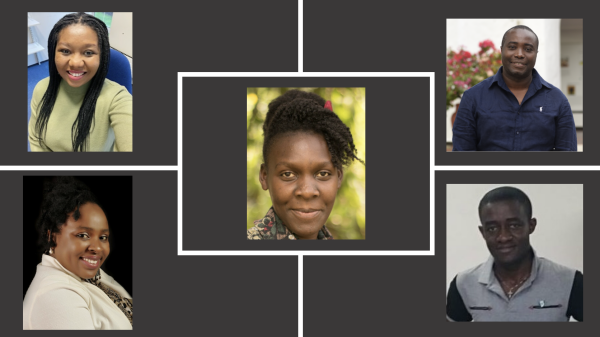
These are photos of the third cohort of PhD students sponsored by Cambridge-Africa when they started in the academic year 2017/2018.
Starting from top left: Esther, Warren, Chioma, David and Margaret (in the centre).
Find out what they are upto below:
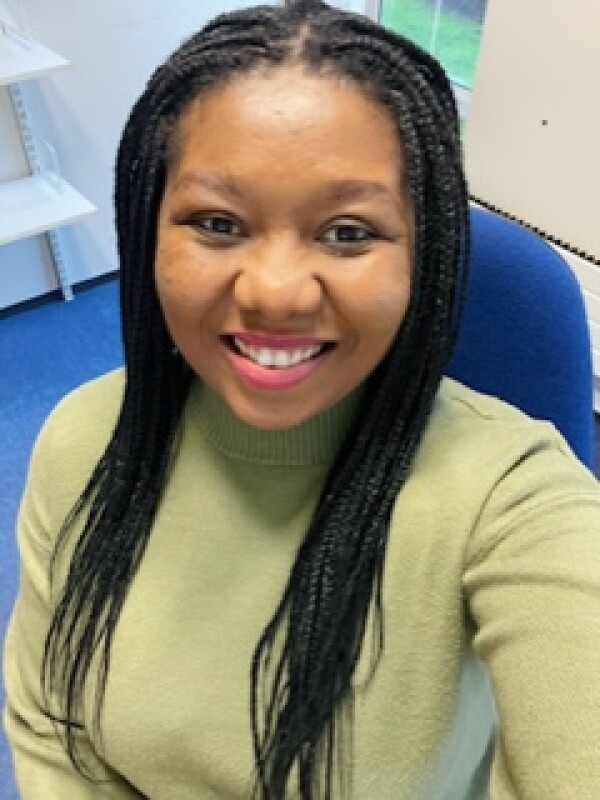
Dr Esther Anwuzia
| Full name | Esther Anwuzia | |
| PhD project | Understanding Adolescents' Career Decision-Making and Career Wellbeing in Nigeria: A Mixed-Methods Study | |
| PhD Supervisor (Department) |
|
|
| Year of completion | 2021 | |
WHERE ARE YOU AT THE MOMENT? |
||
|
I am currently a Postdoc at Bournemouth University on an EU project titled SPEED-You-UP, tackling inequality and deprivation in coastal communities in England, France, Belgium, and the Netherlands, through an innovative entrepreneurship programme for young people at risk of early school leaving and those not in employment, education, or training. |
||
TELL US ABOUT YOUR TIME AT THE UNIVERSITY OF CAMBRIDGE |
||
|
||
TELL US ABOUT YOUR EXPERIENCE SINCE LEAVING THE UNIVERSITY OF CAMBRIDGE |
||
|
I began my current postdoc role in October 2021, immediately after submitting my PhD thesis and moved to Bournemouth in the same month with my husband and then 4-month-old daughter. I grappled with different life transitions, all new to me – a first-time mum, my first post-PhD job, and a new town. It was challenging. I had my daughter in June 2021 while writing up my thesis, but I was determined to submit it by the September 2021 deadline. Recovering from the C-section was an arduous experience; the support from my husband, mum, and other relatives at the time of my delivery was a blessing, and I managed to complete my thesis. My mum moved with us to Bournemouth but shortly returned to Nigeria. It was then up to my husband and me to adjust to our new life. The desire to prove myself as deserving and capable of my job and a mum whose daughter could depend on unfailingly often clashed. Slowly but not so steadily, I began to settle into both domains. Although every day since then has felt like a whirlwind of different emotions, expectations, and demands, I am thankful for the milestones achieved so far, like surviving the first year of being a mum, passing my Viva, publishing the first paper from my PhD, successfully leading the impact evaluation of the SPEED-You-UP project in the UK, and being endorsed for the Global Talent Visa by The British Academy. My daughter is now 19 months old and continues to be more beautiful and spirited. Learning in every aspect of life is endless, but I have grown in confidence as an academic and a mum, and hopeful for new heights. |
||
ALUMNI WISDOM (what can you tell current Cambridge-Africa PhD scholars) |
||
|
Your PhD research and Viva are major targets but not the entirety of your PhD. The people you will meet and connections you will make will outlast your PhD, and some will be bridges into the next phase. You will miss home, family and friends you’ve left behind but look forward with hope and conviction that this moment will translate into outstanding rewards for you and your generation. |
Publications
Anwuzia, E., & McLellan, R. (2022). The Role of Teachers in Adolescents’ Career-Specific Future Orientation. Cambridge Educational Research e-Journal, 9, 258-270. https://doi. org/10.17863/CAM.90565
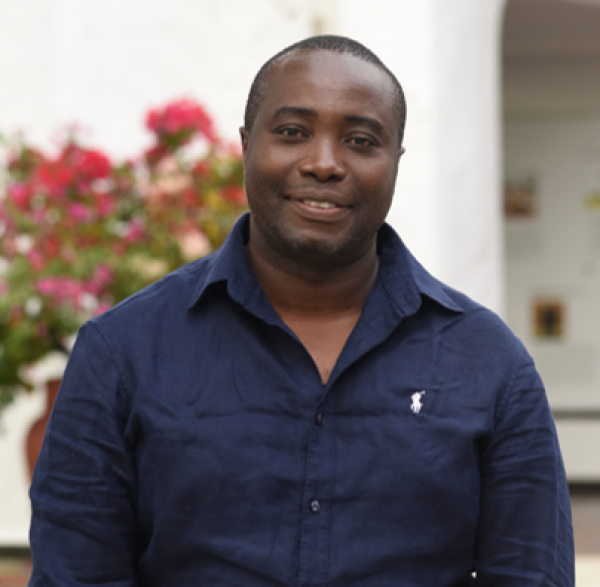
Dr Warren Arinaitwe
|
Full name |
Warren Arinaitwe |
|
Department where you did your PhD |
Plant Sciences |
|
PhD supervisor |
Professor John P. Carr |
|
Title of PhD thesis |
Virus-induced effects on aphid-host interactions in Solanaceous plants |
|
Year of study (start year – finish year) |
2017-2021 |
|
Current place of employment |
International Centre for Tropical Agriculture- CIAT |
|
Position at place of employment |
Plant Pathologist |
|
Email address |
w.arinaitwe@cgiar.org |
WHERE ARE YOU AT THE MOMENT? |
|
I work as a Cassava Pathologist (Asia) for the International Center for Tropic Agriculture-CIAT (https://alliancebioversityciat.org/who-we-are/warren-arinaitwe). I am married to Viola and together we have two boys-Timothy (14 years) and Nathanael (12 years) and a girl – Tabitha (11 years). We all live in Vientiane, Laos PDR. I love cycling - a hobby I picked during COVID lockdowns in the UK.
|
TELL US ABOUT YOUR TIME AT THE UNIVERSITY |
|
I was born and raised in a small mixed-farming community in Southwestern Uganda. I enjoyed farming crops and tending animals at a tender age, but never thought I would study plants up to PhD level and more so at the University of Cambridge. Like every Ugandan child, I aspired to becoming a medical doctor. I worked hard towards this goal. In the end, I could not join medical school because of a low grade in physics. That is how I ended up in the College of Agriculture and Environmental Sciences, Makerere University (Kampala), where I obtained a Bachelor of Science in Agriculture in 2005 and later a Master of Crop Science in 2014. Between 2005 and 2017 when I began studies at the Department of Plant Sciences, I worked as an agricultural officer with the Government of Uganda and a legume associate pathologist with CIAT supporting integrated crop management projects for common beans in Sub-Saharan Africa. Professors John Carr, Christopher Gillian, and David Baulcombe of the Department of Plant Sciences, Cambridge had a collaborative project with CIAT (Uganda) on sustainable management of common bean viruses from 2012 to 2016 where I was instrumental in field experiments and data management. At the end of the project in 2016, I asked John Carr about the possibility of a PhD studentship in plant virology. He encouraged me to apply and provided valuable information on available scholarships, colleges, and feasible research topics. This is how I got accepted into the Department and Corpus Christi College on a Cambridge-Africa scholarship. The collegiate system was a perfect ecosystem for me to grow into a great experimentalist, thrive socially through student associations, and establish lifetime connections with fellow students, visiting scientists, and university researchers. During my PhD, I got several grants to conduct agricultural outreach activities in Uganda, where I trained over 200 farmers on climate-smart agriculture. In 2021, I received an equipment grant from the Cambridge-Africa Alborada Research Fund to establish a mobile soil testing platform at CIAT Uganda. The soil testing kit has since been rolled out to Burundi and the Democratic Republic of Congo where CIAT is supporting the bean value chain. |
TELL US ABOUT YOUR EXPERIENCES SINCE LEAVING THE UNIVERSITY OF CAMBRIDGE |
|
As a family, we relocated from Uganda to Southeast Asia at the start of 2022 to begin work with CIAT Asia. At first, we struggled to cope with the new culture, spicy food, and language but we adapted quickly. As a pathologist for CIAT-Asia cassava program. I oversee research projects aimed at making cassava production systems more climate-smart, efficient, and resilient against transboundary pests and diseases. I engage with national agricultural research institutions in partner countries in monitoring, characterization, and management of key cassava pests and diseases. I conduct pre-emptive disease management research for Africa and the Americas in preparation for future disease outbreaks. I have established the first state-of-the-art regional cassava molecular pathology laboratory in Lao PDR. The cassava molecular laboratory is already pioneering groundbreaking work on characterisation of witches’ broom diseases, a highly transmissible and transboundary cassava disease endemic to Southeast Asia that has been misdiagnosed for over 20 years leading to misuse of chemicals, including antibiotics. The molecular laboratory supports cassava breeding and seed systems by testing mother plants and planting materials to ensure the multiplication and distribution of disease-free materials. The laboratory is involved in validation of molecular diagnostic technology developed in collaboration with interdisciplinary research groups across the globe and shares them with partner countries/institutions in Southeast Asia. It also serves as a regional training hub, where local scientists (through regional workshops) and post-secondary students (via local and international internship programs) are equipped with plant disease diagnostic skills. We are open to hosting interns from anywhere, (and Cambridge too!)! In September 2023, the lab hosted the first international workshop in the region on disease diagnostics attracting experts and participants from Europe, the Americas, Australia, Africa, and Asia. We believe such intercontinental exchanges of expertise, tools, and ideas will cumulatively galvanize local capacity to counter current and emerging transboundary pests and disease outbreaks and support decisions to develop and deploy integrated disease management strategies that can be adapted globally. |
ALUMNI WISDOMIf you could offer a piece of advice, a tip or simply some words of encouragement to those who have travelled from their home countries in Africa to undertake their PhD at the University of Cambridge, what would it be? |
|
The PhD journey can be lonely, and may not be easy, but it is fulfilling. Make your research a priority, but also enjoy the rich student life at Cambridge. The first-year viva is very difficult for everyone, including native English speakers. It is OK to feel inadequate as you prepare for it! |
Publications |
|
Pardo, J. M., Chittarath, K., Vongphachanh, P., Hang, L. T., Oeurn, S., Arinaitwe, W., Rodriguez, R., Sophearith, S., Malik, A.I, and Cuellar, W. J. (2023). Cassava Witches’ Broom Disease in Southeast Asia: A Review of Its Distribution and Associated Symptoms. Plants, 12(11), 2217.https://www.mdpi.com/2223-7747/12/11/2217
Arinaitwe, W., Tungadi, T.D., Pate, A.E., Joyce, J., Baek, E., Murphy, A.M. and Carr, J.P (2023). Induction of aphid resistance in tobacco by the cucumber mosaic virus CMV∆ 2b mutant is jasmonate‐dependent. Molecular Plant Pathology, 24(4), pp.391-395. https://bsppjournals.onlinelibrary.wiley.com/doi/abs/10.1111/mpp.13305
Arinaitwe, W., Guyon, A., Tungadi, T.D., Cunniffe, N.J., Rhee, S.J., Khalaf, A., Mhlanga, N.M., Pate, A.E., Murphy, A.M. and Carr, J.P. (2022). The effects of cucumber mosaic virus and its 2a and 2b proteins on interactions of tomato plants with the aphid vectors Myzus persicae and Macrosiphum euphorbiae. Viruses, 14(8), p.1703. https://www.mdpi.com/1999-4915/14/8/1703
Carr, J.P., Tungadi, T., Donnelly, R., Bravo-Cazar, A., Rhee, S.J., Watt, L.G., Mutuku, J.M., Wamonje, F.O., Murphy, A.M., Arinaitwe, W. and Pate, A.E. (2020). Modeling and manipulation of aphid-mediated spread of non-persistently transmitted viruses. Virus Research, 277, p.197845. http://34.250.91.188:8080/xmlui/handle/123456789/1378 |
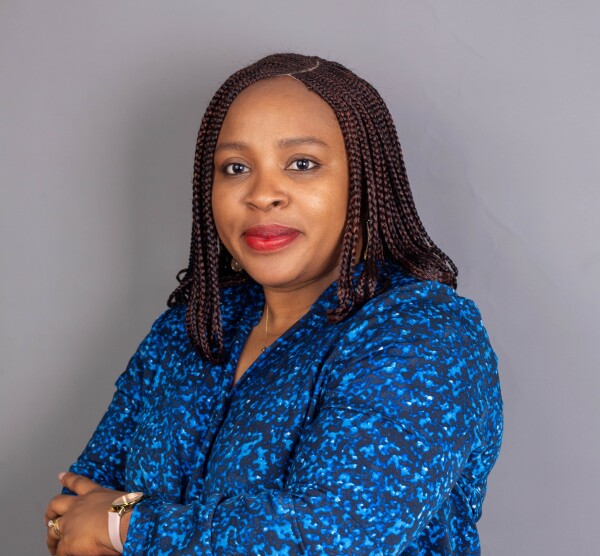
Dr Chioma Rita Achi
| Full name | Dr Chioma Achi |
| PhD project | Genomic diversity and antimicrobial resistance in Salmonella isolates recovered from diverse sources in Nigeria |
| PhD Supervisor (Department) | Professor Mark Holmes |
| Year of completion | 2022 |
| ritahalichi@yahoo.com |
WHERE ARE YOU AT THE MOMENT? |
|
|
I share my time between the United Kingdom and Nigeria. I am a Scientific Project Co-Lead for the Ineos Oxford Institute of Antimicrobial Research and this role involves traveling across project sites. I welcomed an addition to the family in the past year, and it has been an exciting time. |
|
TELL US ABOUT YOUR TIME AT THE UNIVERSITY OF CAMBRIDGE |
|
|
|
TELL US ABOUT YOUR EXPERIENCE SINCE LEAVING THE UNIVERSITY OF CAMBRIDGE |
|
|
At my PhD graduation, I was given a tote bag with an inscription that says “The people who arrive in this city change Cambridge. The ideas that leave this city change the world.” This, I would say, has been the summary of my experience since leaving Cambridge. My PhD at Cambridge better prepared me to face the world, so I am ever more confident taking up challenges. Immediately after submitting my PhD thesis, I took up a job as a Postdoctoral Research Associate for Antimicrobial Research at the INEOS-Institute for Antimicrobial Research at the University of Oxford as Scientific Lead for Nigeria. It was not an easy task setting up the IOI projects in Nigeria, but I am glad that with the support of colleagues and collaborators, we have now got the ball rolling. The research we conduct at the IOI involves working with collaborators across sites and countries, and the experience has been rewarding. I am Scientific Lead for Nigeria, supporting the research we do across 8 sites in Nigeria. I am also co-lead for the AVIAR (arthropods and antimicrobial research research) study at the IOI. In July 2023, I received an upgrade from Postdoctoral Research Associate to Scientific Project Co-lead at the IOI, which is exciting and a testament to hardwork thus far. I have also built a strong network of collaborators both within the UK and in Nigeria, some of which include working on the Fish Genomics project with collaborators from the Royal Holloway University and Royal Veterinary College, University of Oxford, and many other universities and on the Nigeria Mpox project with collaborators from the London School of Hygiene and Tropical Medicine, the University of Oxford and other Nigerian collaborators. I have also had the opportunity to consult for the World Bank on Antimicrobial Resistance. I will stop here, but I am optimistic for even a brighter and more successful future. |
|
ALUMNI WISDOM (what can you tell current Cambridge-Africa PhD scholars) |
|
|
Enjoy and make the most of your time at Cambridge. The PhD journey might be tough and lonely and it could sometimes feel as though it would never end. But, do remember there is always light at the end of the tunnel, and at the end, you will be proud of all your accomplishments for the rest of your life. Also make friends while you are there, do all the reading, but also find time to enjoy the Cambridge Students life so you are not alone by yourself – good friends will be there for life. Lastly, ask for help if needed, and don’t struggle alone – Cambridge is a big place, and it might be easy to feel lost, so please don’t suffer in silence. |
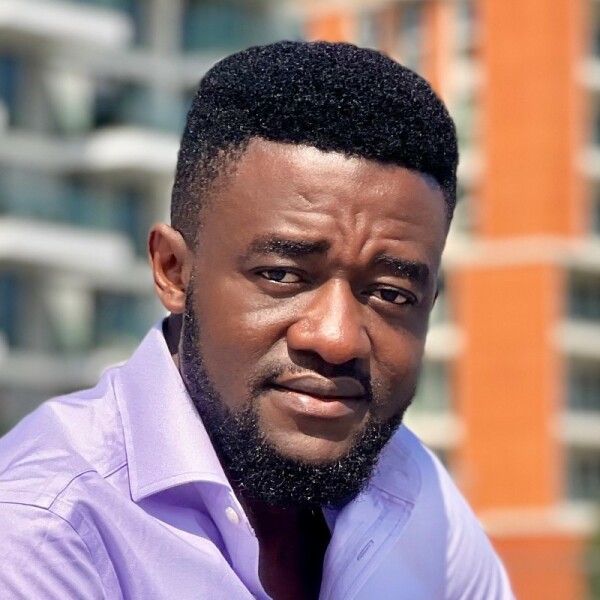
Dr David Chukwuma Izuogu
|
Full name |
David Chukwuma Izuogu |
|
Department where you did your PhD |
Yusuf Hamied Department of Chemistry |
|
PhD supervisor |
Dr Alex J. W. Thom |
|
Title of PhD thesis |
Lanthanide-based single-molecule magnets: A rational design by chemical intuition |
|
Year of study (start year – finish year) |
2017 - 2021 |
|
Current place of employment |
McKinsey & Company |
|
Position at place of employment |
Consultant |
|
Email address |
david.izuogu@myhealthintegral.com |
WHERE ARE YOU AT THE MOMENT?
|
Currently, I am deeply engaged in a dynamic blend of professional, research, and entrepreneurial activities. As a consultant at McKinsey & Company, I lead high-impact projects that shape strategic transformations across industries for global clients. Concurrently, I serve as the Founder and Chairman of the Board of Trustees for the Africa of Our Dream Education Initiative, a foundation dedicated to educational advancement. I am also actively developing two startups: a digital health platform aimed at revolutionizing healthcare access and a real estate platform designed to innovate property management. |
TELL US ABOUT YOUR TIME AT THE UNIVERSITY OF CAMBRIDGE |
|
My educational journey was not straightforward, shaped by a childhood where family and financial instability were prevalent. Growing up, I lived with different family members, which, although challenging, instilled a fierce determination to overcome adversity and succeed academically. This resolve led me to cherish education, despite the uncertainty of being able to pursue it due to financial constraints. My aunt's initial support enabled me to begin my university education in chemistry at the University of Nigeria, Nsukka—a field I chose due to its practical application in various industries and its potential for broad impact. My passion for chemistry was ignited by a fascination with the tangible results it produced, from everyday products to complex materials. This interest was further fuelled by the subject's potential to foster innovative solutions to real-world problems. After founding Chucks Academy to financially support myself through university, I ventured abroad to Japan for an exchange program, which expanded my horizons and introduced me to the advanced study of Nano-science of Advanced Metal Complexes. The transformative experience in Japan during my undergraduate at Hokkaido University and master’s program at Tohoku University led me to pursue further education at the University of Cambridge. The decision to study at Cambridge was driven by its reputation for fostering interdisciplinary research and a vibrant academic community that I believed would enable me to pursue my ambition of commercializing scientific research. Supported by the Cambridge-Africa Scholarship and the IsDB Merit Scholarship for Technology through the Cambridge Trust, I embarked on a Ph.D. in Computational Chemistry. At Cambridge, my academic pursuits were intertwined with a deep commitment to the student community. I was elected as the International Officer of the Cambridge Student Union and later as the President of the Wolfson College Student Association. My roles allowed me to significantly contribute to the student experience, especially for Black students, by being part of the team that established the University of Cambridge Black Advisory Hub. My enduring memories of Cambridge are not only of the rigorous academic environment but also of the vibrant student life that I actively engaged in. I participated in numerous departmental, university-wide, and college-wide committees, which enriched my understanding of the operational aspects of a global educational institution. Moreover, my entrepreneurial spirit found expression through the Enterprise Technology Program at the Judge Business School, which equipped me with the skills necessary to launch and manage startups. This entrepreneurial drive led me to found the Africa of Our Dream Initiative, aimed at supporting African students in accessing global educational opportunities, fostering partnerships between researchers in the global north and south, and contributing research equipment to support scientific endeavors in Africa. My contributions and impact at Cambridge were recognized through several prestigious awards, including the Honorary Trinity-Henry Barlow Award, the University of Cambridge Vice-Chancellor’s Social Impact Award, Dr. Amit Bhasin Prize, CAS Future Leader Award, Royal Society of Chemistry Excellence Award, Trinity Bradfield Prize, Outstanding Student Contribution to Education Award in Access and Outreach, endorsement by The Royal Society for the UK Global Talent Visa, the BBSRC-FTMA Award for early researchers, and the Cambridge-Africa Early Career Research grant among others. These accolades not only honored my academic and social contributions but also underscored my commitment to making a meaningful impact both within and beyond the academic community. If you are interested in detailed compilation of my activities while in Cambridge, visithttps://linktr.ee/davidizuogu |
TELL US ABOUT YOUR EXPERIENCE SINCE LEAVING THE UNIVERSITY OF CAMBRIDGE |
|
Reflecting on my journey since graduating from the University of Cambridge, my professional and entrepreneurial endeavors have been both diverse and fulfilling. I currently work full-time as a consultant with McKinsey & Company, where I engage with global businesses and government entities, tackling their most significant challenges. This role not only allows me to apply the strategic thinking and problem-solving skills honed during my Ph.D. but also fuels my entrepreneurial spirit to innovate and create impactful solutions. My consulting work has led me to focus increasingly on product development that addresses societal needs while generating sustainable value. The challenges I encounter daily at McKinsey inspire continuous learning and adaptation, which are crucial in my role as a leader and innovator. Parallel to my consulting career, I maintain a strong connection to academic research and community development through my foundation, the Africa of Our Dream Education Initiative (AODI). Through AODI, we facilitate access for African students to top global universities and conduct workshops and scientific training sessions across African universities. This work is deeply rewarding as it aligns with my commitment to education and empowerment. Moreover, my ongoing passion for research keeps me engaged as a Visiting Researcher at the Department of Chemistry, University of Cambridge. Here, I explore cutting-edge topics that complement my interests in entrepreneurship and technology. Currently, I am excited to be at the forefront of founding two technology-driven startups in the fields of digital health and real estate. These ventures are designed to tackle significant issues in healthcare accessibility and housing, utilizing advancements in AI, GenAI, Blockchain, and extended reality. We are actively seeking collaboration with experts and researchers in these technologies, particularly those specializing in preventive care and genomics, to join us in transforming these industries. This phase of my career is not just about achieving professional goals but also about creating meaningful, real-world applications for advanced research and innovations. I am particularly proud of the interdisciplinary approach we are fostering, which not only bridges the gap between theory and practice but also creates a significant impact on society. Looking forward, I am committed to expanding these initiatives, further integrating technology with practical applications, and continuing to support the next generation of scholars and innovators. |
ALUMNI WISDOM (what can you tell current Cambridge-Africa PhD scholars) |
|
Embarking on a PhD at the University of Cambridge is a transformative journey that extends beyond academic excellence to personal growth. My advice to fellow Africans venturing into this esteemed academic environment is to embrace every opportunity for interdisciplinary collaboration and networking. Cambridge offers a unique platform to connect with pioneering thinkers and leaders from diverse fields. Seize these connections, and let them enrich your research and broaden your perspectives. Remember, you carry the hopes and expectations of your home countries. Use this platform not only to excel academically but to prepare to make meaningful contributions back home. Stay curious, be resilient, and above all, believe in the value of your unique insights and cultural perspectives. |
Publications |
|
Hidden Heterometallic Interaction Emerging from Resonant Inelastic X‑ray Scattering in Luminescent Tb–Pt Molecules T Yoshida, A Shabana, DC Izuogu, K Fuku, T Sato, H Zhang, Y Yamamoto, J Kamata, H Ohmagari, M Hasegawa, G Cosquer, S Takaishi, T Kaneko, T Uruga, Y Iwasawa, M Yamashita, The Journal of Physical Chemistry C, (2022) 126, 7973 (doi: 10.1021/acs.jpcc.2c01396)
Insight into the Gd–Pt Bond: Slow Magnetic Relaxation of a Heterometallic Gd–Pt Complex T Yoshida, A Shabana, H Zhang, DC Izuogu, T Sato, K Fuku, H Abe, Y Horii, G Cosquer, N Hoshino, T Akutagawa, AJW Thom, S Takaishi, M Yamashita, Bulletin of the Chemical Society of Japan, (2022),95, 513, (doi: 10.1246/bcsj.20210429)
N'-(Pyridin-3-ylmethylene)benzenesulfonohydrazide: Crystal structure, DFT, Hirshfeld surface and in silico anticancer studies IS Ozochukwu, OC Okpareke, DC Izuogu, A Ibezim, OT Ujam, JN Asegbeloyin, European Journal of Chemistry, (2021), 12, 256, (doi: 10.5155/eurjchem.12.3.256-264.2102)
Lanthanide-based single-molecule magnets: A rational design by chemical intuition DC Izuogu PhD Thesis, (2021), (doi: 10.17863/CAM.85023)
Structural, computational and antimicrobial studies of 2-[(E)-[2-(2,4,6-trimethylbenzenesulfonyl)-hydrazinylidene] methyl] benzoic acid and its Cu(II), Zn(II) and Co(II) complexes MO Nwokelo, DC Izuogu, OC Okpareke, CU Ibeji, EE Oyeka, JR Lane, JN Asegbeloyin, Journal of Molecular Structure, (2021), 1225, 129019, (doi: 10.1016/j.molstruc.2020.129019)
Periodicity of Single‐Molecule Magnet Behaviour of Heterotetranuclear Lanthanide Complexes across the Lanthanide Series: A Compendium DC Izuogu, T Yoshida, G Cosquer, JN Asegbeloyin, H Zhang, AJW Thom, M Yamashita, Chemistry (Weinheim an der Bergstrasse, Germany), (2020), 26, 6036, (doi: 10.1002/chem.202000161)
2-[(2,4,6-Tri-methyl-benzene)-sulfon-yl]phthalazin-1(2H)-one: crystal structure, Hirshfeld surface analysis and computational study. DC Izuogu, JN Asegbeloyin, MM Jotani, ERT Tiekink, Acta Crystallographica Section E Crystallographic Communications, (2020), 76, 697, (doi: 10.1107/S2056989020005101)
Ionic-caged heterometallic bismuth-platinum complex exhibiting electrocatalytic CO2 reduction. T Yoshida, HM Ahsan, H-T Zhang, DC Izuogu, H Abe, H Ohtsu, T Yamaguchi, BK Breedlove, AJW Thom, M Yamashita, Dalton transactions (Cambridge, England : 2003), (2020), 49, 2652,(doi: 10.1039/c9dt04817k) An Organic-Inorganic Hybrid Exhibiting Electrical Conduction and Single-Ion Magnetism. Y Shen, G Cosquer, H Ito, DC Izuogu, AJW Thom, T Ina, T Uruga, T Yoshida, S Takaishi, BK Breedlove, Z-Y Li, M Yamashita, Angew Chem Int Ed Engl, (2020), 59, 2399,(doi: 10.1002/anie.201910523)
An Organic–Inorganic Hybrid Exhibiting Electrical Conduction and Single‐Ion Magnetism Y Shen, G Cosquer, H Ito, DC Izuogu, AJW Thom, T Ina, T Uruga, T Yoshida, S Takaishi, BK Breedlove, Z Li, M Yamashita, Angewandte Chemie, (2020), 132, 2420,(doi: 10.1002/ange.201910523)
Correction: Ionic-caged heterometallic bismuth-platinum complex exhibiting electrocatalytic CO2 reduction. T Yoshida, H Md Ahsan, H-T Zhang, DC Izuogu, H Abe, H Ohtsu, T Yamaguchi, BK Breedlove, AJW Thom, M Yamashita, Dalton transactions (Cambridge, England : 2003), (2020), 49, 4578,(doi: 10.1039/d0dt90053b)
Crystal structure, non-covalent interaction and molecular docking studies of 2-{[2-phenylsulfonyl)hydrazinylidene]methyl}benzoic acid and its dysprosium catalysed cyclized product: 2-(phenyl-sulfonyl)phthalazin-1(2H)-one JN Asegbeloyin, DC Izuogu, EE Oyeka, OC Okpareke, A Ibezim, Journal of Molecular Structure, (2019), 1175, 219 (doi: 10.1016/j.molstruc.2018.07.073)
Ln-Pt electron polarization effects on the magnetic relaxation of heterometallic Ho- and Er-Pt complexes T Yoshida, DC Izuogu, H-T Zhang, G Cosquer, H Abe, W Wernsdorfer, BK Breedlove, M Yamashita, Dalton Trans, (2018), 48, 7144, (doi: 10.1039/c8dt03338b)
Synthesis, crystal structure, computational analysis and biological properties of 1-(4-chlorobenzoyl)-3-[2-(2-{2-[3-(4-chlorobenzoyl)-thioureido]-ethoxy}ethoxy)ethyl]-thiourea and its Ni(II) and Cu(II) complexes EE Oyeka, JN Asegbeloyin, I Babahan, B Eboma, O Okpareke, J Lane, A Ibezim, HH Bıyık, B Törün, DC Izuogu, Journal of Molecular Structure, (2018), 1168, 153,(doi: 10.1016/j.molstruc.2018.05.015)
Slow Magnetic Relaxation in a Palladium–Gadolinium Complex Induced by Electron Density Donation from the Palladium Ion DC Izuogu, T Yoshida, H Zhang, G Cosquer, K Katoh, S Ogata, M Hasegawa, H Nojiri, M Damjanović, W Wernsdorfer, T Uruga, T Ina, BK Breedlove, M Yamashita, Chemistry – A European Journal,(2018), 24, 9169, (doi: 10.1002/chem.201802702)
Front Cover: Slow Magnetic Relaxation in a Palladium–Gadolinium Complex Induced by Electron Density Donation from the Palladium Ion (Chem. Eur. J. 37/2018) DC Izuogu, T Yoshida, H Zhang, G Cosquer, K Katoh, S Ogata, M Hasegawa, H Nojiri, M Damjanović, W Wernsdorfer, T Uruga, T Ina, BK Breedlove, M Yamashita, Chemistry – A European Journal,(2018), 24, 9165, (doi: 10.1002/chem.201802701)
Multiple Magnetic Relaxation Pathways and Dual‐Emission Modulated by a Heterometallic Tb‐Pt Bonding Environment T Yoshida, DC Izougu, D Iwasawa, S Ogata, M Hasegawa, BK Breedlove, G Cosquer, W Wernsdorfer, M Yamashita, Chemistry – A European Journal, (2017), 23, 10527, (doi: 10.1002/chem.201702989)
Field-Induced Slow Magnetic Relaxation of Gd T Yoshida, G Cosquer, DC Izuogu, H Ohtsu, M Kawano, Y Lan, W Wernsdorfer, H Nojiri, BK Breedlove, M Yamashita, Chemistry – A European Journal (Weinheim an der Bergstrasse, Germany),(2017), 23, 4551, (doi: 10.1002/chem.201700886)
|
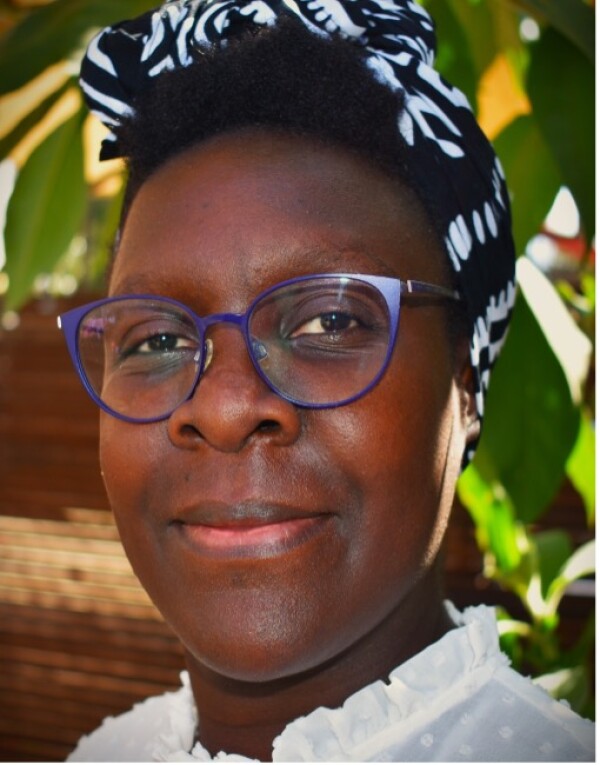
Margaret Kerubo Ontita
|
Full name |
Margaret Kerubo Njenga |
|
Department where you did your PhD |
Sociology |
|
PhD supervisor |
Dr Maria Iacovou |
|
Title of PhD thesis |
Masculinity and fatherhood in Kenya: How father-inclusive health education can challenge gender norms and shape fathers’ involvement in the care of preterm infants |
|
Year of study (start year – finish year) |
2017-2025 |
|
Current place of employment |
MXL Re-Analytics Ltd (a health consultancy firm that focuses on epidemiology, nutrition and food security) |
|
Position at place of employment |
Consultant – Maternal, Newborn & Family Health |
|
Email address |
|
Where are you at the moment? |
|
I am currently based in Nanyuki, Kenya, where I continue to work on gender and infant care, providing technical support for projects that explore how parents engage in the care of vulnerable children and how health systems can strengthen family-centred support. Outside of work, I enjoy homemaking and spending time with my family, reading eclectically, creative writing, photography, and exploring my love of food as an avid home chef. |
Tell us about your time at the University |
|
When I began my PhD, I arrived from Kenya still in slight disbelief at the extraordinary opportunity to pursue a doctorate at The University of Cambridge: fulfilling a long-held dream to pursue academia to its highest level and to experience one of the world’s most storied universities. My interest in preterm infant care had taken root during my master’s research, where I explored caregiving practices and health outcomes for babies born too soon. That work revealed a clear gap in parental involvement within hospital settings and highlighted the maternal-centric nature of many infant health programmes. I wanted to understand what this exclusion said about gender, care, and power; and how research could offer practical, inclusive tools for change. Cambridge provided the ideal space to think critically and expansively about these questions. In the Department of Sociology, I learned to connect theory with lived experience, guided by my supervisor who encouraged intellectual rigour, curiosity, and reflexivity. Those conversations often challenged me to think beyond disciplinary boundaries and to locate my research within broader scholarly debates. Wolfson College quickly became a second home; a place of engaging dinner-table conversations, easy camaraderie, and a shared academic spirit that made postgraduate learning feel both communal and deeply personal. My most cherished memories include rowing with the college social boat club on quiet Sunday mornings; wandering through Cambridge’s awe-inspiring architecture and resplendent gardens which inspired me to buy my first DSLR camera and pick up photography; and writing late into the night in the library, learning to embrace solitude as part of the research process. When the pandemic struck midway through my PhD, the isolation demanded adaptability and inevitably reshaped the rhythm and timelines of my work. Yet it also offered space for reflection on what truly matters in life. All in all, Cambridge was more than an academic pursuit; it was a journey of growth. I arrived eager to learn, and I left transformed; more reflective, open, and grounded in the belief that scholarship should not only interpret the world but also show care for it. |
Tell us about your experiences since leaving the University |
|
I am now a mother of three and this has been the most beautifully rewarding experience of my life; incredibly challenging, yet endlessly delightful! The way modern life is set up, I’m blessed to be able to choose work assignments that allow me to prioritise being home with my young children during their formative years, by working part-time and remotely. Over the past two years, I have consulted on several projects based in East Africa, providing technical input on gender, nutrition, and family-centred neonatal care. My work includes designing grant proposals, advising on mixed-methods research, and developing gender- and nutrition-sensitive materials to strengthen family engagement and equity in maternal and newborn health programmes. One of my current priorities is publishing my doctoral work. During the PhD, much of my energy was devoted to fieldwork and writing the thesis itself, so publishing had to wait; but I am now preparing several manuscripts for submission. Seeing that my work reaches a wider audience is an important next step. Looking ahead, I hope to deepen my involvement in research and policy on family-centred care. I love teaching and was an assistant lecturer at the University of Nairobi while pursuing my master’s and in the period before starting my doctorate, I hope to circle back to academia in the future. Cambridge was a forever-impactful experience; it elevated my academic writing, sharpened my critical thinking, and reshaped how I engage with ideas and the world around me; while introducing me to remarkable people whose insight and friendship continue to inspire me. |
Alumni wisdomIf you could offer a piece of advice, a tip or simply some words of encouragement to those who have travelled from their home countries in Africa to undertake their PhD at the University of Cambridge, what would it be? |
|
Getting into Cambridge is no small feat, you earned your place, so never doubt that you belong there. Don’t let imposter syndrome cloud your experience; your background and perspective as a scholar from Africa are powerful assets. Take time to build community, find mentors who see and support you, and let your research be driven by curiosity rather than comparison. The journey will stretch you in ways you can’t yet imagine, but it will also refine you. Despite the challenges you’ll face, keep going; it’s a marathon, not a sprint. And above all, soak it in and savour every moment because this may well be a defining phase of your life. |
|
Publications (if any)
|
|
|

